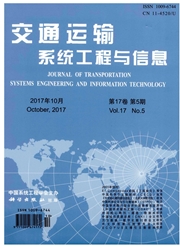

 中文摘要:
中文摘要:
为了应对某些紧急且重要的出行需求,铁路部门会分配部分机动票额.由于机动票额需求的不确定性和运输产品的不可存贮性,一般会在开车前的某一时机将机动票额调整为公用票额,以避免席位浪费.为合理设置票额用途调整时机,本文基于机动票额和公用票额的期望需求,考虑机动票的额外社会效益,构建以铁路企业期望效益最大化为目标的票额用途调整数学模型,并设计动态决策方法对模型进行求解.算例表明,本文提出的模型能准确描述票额用途调整时机的最优决策问题,基于动态决策过程的求解算法计算效率较高且具有较强的可操作性,可使铁路部门的实际效益比期望效益增加14.3%,比既有的固定转票时间方法所得效益增加33.3%,为科学的客票管理提供理论支持.
 英文摘要:
英文摘要:
The railway sectors usually set aside a certain amount of tickets unsold for possible confidential or emergency travel needs. Due to randomness of the demand for the flexible use and non- storage of transport products, the reserved tickets will be sold at a time before the train departure to avoid waste of service resource. Based on additional benefits of reserved tickets and expected demands of tickets for flexible and public use, this paper proposes a model on adjustment strategy of railway tickets usage to maximize the expected revenue of railway enterprises. A dynamic decision-making approach is designed to solve the proposed model. The numerical example indicates that the proposed model is able to explain the relationship between the adjustment timing and the total benefits accurately and the proposed approach has high computational efficiency and strong operability, which leads to 14.3 percent increase in total benefits than expected and 33.3 percent increase in total benefits by the existed adjustment strategy. This provides theoretical support for scientific ticket management.
 同期刊论文项目
同期刊论文项目
 同项目期刊论文
同项目期刊论文
 期刊信息
期刊信息
